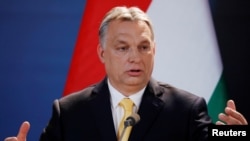Hungarian Prime Minister Viktor Orban said on Tuesday his landslide re-election had given him a powerful mandate to restrict migrant rights and push for a European Union of independent nations rather than a "United States of Europe."
The right-wing nationalist leader, whose resounding victory on Sunday dismayed opposition parties, also said he planned to revamp his government,"in large part with new people and a new structure," but that he would not seek a presidential system.
Orban romped to a third straight term in power with an anti-immigration campaign, restoring his Fidesz party's overwhelming parliamentary majority with two-thirds of the seats based on preliminary results.
"We have received a strong mandate," Orban, 54, told his first news conference since his triumph, which triggered the resignation of opposition leader Gabor Vona, whose Jobbik party's shift from the xenophobic far right toward the center failed to dent the increasingly rightist Fidesz.
A major Hungarian newspaper owned by tycoon Lajos Simicska, a former ally of the prime minister, announced it would shut down on Wednesday after eight decades in the latest sign of independent media disappearing under Orban's rule.
"The Hungarian people have defined the most important issues: these are the questions of immigration and national sovereignty," Orban said.
"It is entirely clear ... from the election result that Hungarians have decided that only they can decide with whom they want to live in Hungary, and the government will stick to this position."
Fidesz signaled on Monday it could press on with legislation to crack down on organizations promoting migrant rights as soon as parliament reconvenes.
The government's "Stop Soros" bill submitted to parliament before the election would impose a 25 percent tax on foreign donations to NGOs that the government says back migration in Hungary. "Stop Soros" refers to Hungarian-born U.S. billionaire George Soros, whose funding of liberal democratic, open-border causes in Europe has made him a bitter adversary of Orban.
"The election, in my view, also ... decided that the Hungarian government must stand up for a Europe of nations and not for a 'United States of Europe,'" said Orban, an opponent of deeper integration within the European Union.
His victory could embolden Orban to put more muscle into a Central European alliance against EU migration policies, working with other right-wing nationalists in Poland and Austria, and further expose cracks in the 28-nation bloc.
Deeper ties
Orban, who portrays himself as the saviour of Hungary's Christian culture against Muslim migration into Europe, added that he would cultivate deeper relations with nationalist-ruled Poland and the conservative German region of Bavaria. Polish and Bavarian authorities both publicly supported his re-election campaign.
Orban said he would not use his two-thirds majority to amend the constitution to create a presidency, saying he concluded after his first election victory in 2010 that the parliamentary system was the most stable.
"We decided not to move to a presidential system because it is unknown territory and I think that consideration is still valid," he said.
Orban also affirmed his commitment to fiscal discipline, endorsing the approach of central bank Governor Gyorgy Matolcsy, his former economy minister, who stabilized Hungary's finances with special taxes on banks, energy and telecoms companies.
"I belong to the economic school of Matolcsy. One of the principles of this school is that finances must be in order," Orban said. His government targets a budget deficit worth 2.4 percent of gross domestic product this year.
"The budget deficit must be reduced ... and you can expect state debt to decline and finances must be in order."
Before the election, Orban said he would target annual economic growth of 4 percent in his next term. He said Hungary would reach full employment by 2022 with rising wages and further cuts in payroll taxes.
"We expect Hungary to continue the combination of a relatively tight fiscal policy and ultra-loose monetary policy," economists at Nordea said in a note.
"Hence, on the fiscal side the government will likely try to reduce the outflow of workers to avoid increasing inflation pressure via labor shortages and higher wage demands."
This story was written by Reuters.





